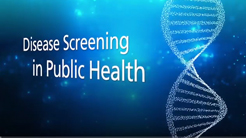Target Audience
People interested in public health, especially those wanting to acquire the skills needed to be involved in the scientific field of screening.
No background expertise is required.
Overview
Current and future public health is characterized by the increase of chronic and degenerative diseases, corresponding to the worldwide ageing of the population. The increasing prevalence of these conditions together with the long incubation period of the chronic diseases and the continual technological innovations, offer new opportunities to develop strategies for early diagnosis.
By helping early detection of risk factors, screening can be very beneficial for public health. However, Public Health has an important mandate to critically assess the promises and the pitfalls of disease screening strategies.
Click on the image below to watch the trailer :

Objectives
- To increase the competency of people involved in the scientific field of screening
- To understand the public health perspective in screening programs
- To explain the evidence needed to select, design, implement and evaluate screening programs
Program
Week 1 : Introduction to Key Concepts in Screening
Week 2 : Screening metrics
Week 3 : Screening in Pregnancy and Newborns
Week 4 : Screening for Cardiometabolic Conditions
Week 5 : Cancer Screening
Week 6 : Public Mental Health and Screening in Ageing
Week 7 : Screening in Low and Middle-Income Countries and Migrants
Week 8 : Evaluation, Planning, Implementation and the Future of Screening Programs
Instructors
- Gillian Bartlett-Esquilant, Professor of Epidemiology and Research and Graduate Program Director and Associate Chair for the Department of Family Medicine at McGill University, Quebec & Institute of Social and Preventive Medicine, Lausanne.
- Antoine Flahault, Professor of Public Health and Director of the Institute of Global Health (Faculty of Medicine, University of Geneva) and co-Director of Centre Virchow-Villermé (Université Paris Descartes)
- Fred Paccaud (In Partnership with UNIGE), Professor of epidemiology and public health and Director of the Institute of social and preventive medicine
Certification
Upon payment, a certificate of attendance could be delivered at the end of the course.
Organisation
Organising Committee :
- Institute of Global Health, University of Geneva, Switzerland
- Institute of Social and Preventive Medicine (UNISANTE), Faculty of Biology and Medicine, University of Lausanne, Switzerland
Collaboration :
- Ecole romande de santé publique (ERSP)
- Swiss School of Public Health (SSPH+)
Program Directors :
- Gillian Bartlett-Esquilant, Professor of Epidemiology and Research and Graduate Program Director and Associate Chair for the Department of Family Medicine at McGill University, Quebec & Institute of Social and Preventive Medicine, Lausanne.
- Antoine Flahault, Professor of Public Health and Director of the Institute of Global Health (Faculty of Medicine, University of Geneva) and co-Director of Centre Virchow-Villermé (Université Paris Descartes)
- Fred Paccaud (In Partnership with UNIGE), Professor of epidemiology and public health and Director of the Institute of social and preventive medicine
Practical information
Schedule :
Ongoing program, 7 weeks of study, 1-3 hours/week
Registration :
No background expertise is required.
Course fee :
This course is free of charge.
(Upon payment, a certificate of attendance could be delivered at the end of the course.)

